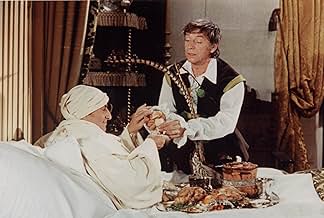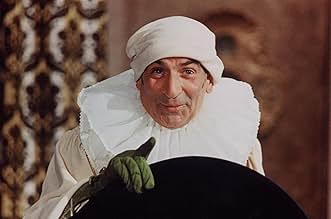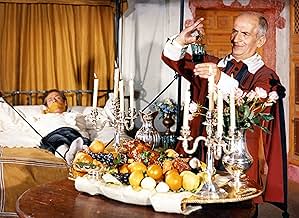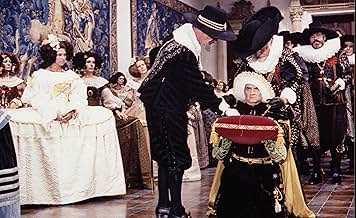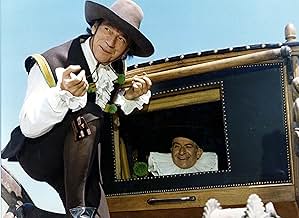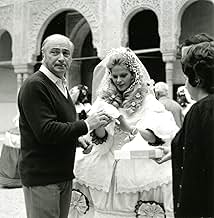IMDb-BEWERTUNG
7,1/10
8463
IHRE BEWERTUNG
In Spanien des 17. Jahrhunderts versuchen Finanzminister, die Königin zu entehren. Aber sein Plan war zu kompliziert.In Spanien des 17. Jahrhunderts versuchen Finanzminister, die Königin zu entehren. Aber sein Plan war zu kompliziert.In Spanien des 17. Jahrhunderts versuchen Finanzminister, die Königin zu entehren. Aber sein Plan war zu kompliziert.
Joaquín Solís
- Un Grand d'Espagne
- (as Joachim Solis)
Sal Borgese
- Le borgne
- (as Salvatore Borgese)
Empfohlene Bewertungen
In 1970, director Gérard Oury was the king of French popular comedy, having conquered the highest box-office summits with "The Sucker" and "The Great Stroll", both starring Louis de Funès and Bourvil. "Third time's a charm" Oury probably figured when he was planning to feature the memorable duo in a comical adaptation of Victor Hugo's "Ruy Blas", a tale of ambitions, convoluted plots, schemes and masquerades set in the flamboyant world-ruling Spain of the 17th century. Oury had the reputation, the capability and more than anything, the dough.
But it was fate that took a stand against him, for the great Bourvil failed the whole world of cinema and died in the most untimely fashion in 1970 at the age of 52, leaving French cinema orphan of his likability. But De Funès was at the peak of his career and he needed a partner, not a sidekick, a real co-star. Gérard Oury was at loss until Simone Signoret suggested her husband, Yves Montand. Montand was a singer and dancer but his romantic aura earned him many memorable leading man roles; it was time for him to display the natural comedic talent he owed to his music-hall days. And Montand pulls a superb performance as De Funès valet.
There's a natural complementarity different from the one with Bourvil, but with comedic potential as well. Bourvil was the 'lovable' average guy and De Funès the bossy one with a hair-trigger temper, but Montand is everything De Funès is not, whether in looks or personality. De Funès can manipulate him but the novelty is that he can envy him secretly. The two opposite attract as they say, Saluste is the King Minsitry's of Finance, Louis de Funès at his cruelest, meanest and scroogiest, he's like a live-action version of French famous comic-book caliph Iznogoud or Disney's Prince John, spotting a ridiculous hat with two green bobbles. When he comes to take the taxes, and a poor official laments that the people are poor Saluste turns his head and the bobbles hit the guy's face "That's normal, poor are meant to be very poor and rich very rich".
Now, this was the plain-villainous role De Funès' needed, but never vileness at the expenses of sympathy, even something as ridicule as his bobbles makes him look more grotesque than villainous. And Montand is the handsome, resourceful and clever valet who only plays the fool to fool his master, but he's not to be overshadowed by De Funès, he can be romantic, hell he can even be funny. The scene where he starts dancing the flamenco much to his master's displeasure is simply Montand establishing his presence, and the scene where Saluste orders him to walk on his knees because he doesn't want to look smaller is De Funès feeling literally towered.
"Delusions of Grandeurs" starts with the perfect casting choice and then all it takes is a sweeping and swashbuckling story that would have made Cecil B. De Mille jealous. This is a summit of French comedy as one of the first high-budgeted movies made for the sake of laughs, the opening sets the tone, it's fast-paced, exhilarating and served by a score made by Michel Polnareff and that supposedly spoofs Western Spaghetti's themes, spoof or no spoof, in its own right, it's one of the most memorable scores of French cinema. And thanks to the budget, to the setting in the magnificent palaces of Alhambra or in the desert of Almeria (to represent the Barbarians region), Oury gives a tremendous believability to his story, enhancing the two comical and romantic effects, but ultimately even the romances are vehicles to the comedy.
The plot involves the ambition of Saluste to take vengeance from the Queen (a German young girl) who just deprived him from his rank and fortune, by using Blaze as a foil, but Blaze falls in love with the beautiful girl and just when you think the material will turn into sappiness, there's a wonderful quiproquo involving the duenna, a severe no-nonsense killjoy played by Alice Sapritch, Dona Juana. One of the best twists of the film is to see the heart of this old hag melt and falling in love with Blaze, and culminating in an expected strip-tease moment, one of the funniest scenes of French cinema. This is De Funès' film, no doubt about it, but you also remember it from the performances of Montand and Sapritch, who even steal from him the final laugh.
Of course, the film has aged a little at times, but this also features Louis de Funès at the top of his game as an irredeemable greedy man, representative on the corners one's ambition might drive him, it's the culmination of a certain vision of French cinema with comedy being the most important genre. The film didn't reach the six-million breach which was disappointing by Oury's standards but it was a huge popular success, full of immortal quotes, one of them being the 'Gold' scene playing on the rhyming effect of "Or" with common French words and some slapstick moments borrowed from Looney Tunes or spoof movies, like the bath scene, Saluste checking how a one-eyed man can see and his gasping at the film's climax, not to mention a few camel laughing and an Arab proud of having the most mundane desert jail.
And when criticized for making a popular cinema (yes, this was the New Wave days said) Oury came back with the best answer, refusing the use of this word "From Euripides to Anouilh ou Pinter, who ever dreamed to play in front of empty chairs? Making message movies is fashion, my message is to make people laugh." When people laugh, they're not mean. How true is that, and how great it is to laugh at mean people, especially when they're played by De Funès.
But it was fate that took a stand against him, for the great Bourvil failed the whole world of cinema and died in the most untimely fashion in 1970 at the age of 52, leaving French cinema orphan of his likability. But De Funès was at the peak of his career and he needed a partner, not a sidekick, a real co-star. Gérard Oury was at loss until Simone Signoret suggested her husband, Yves Montand. Montand was a singer and dancer but his romantic aura earned him many memorable leading man roles; it was time for him to display the natural comedic talent he owed to his music-hall days. And Montand pulls a superb performance as De Funès valet.
There's a natural complementarity different from the one with Bourvil, but with comedic potential as well. Bourvil was the 'lovable' average guy and De Funès the bossy one with a hair-trigger temper, but Montand is everything De Funès is not, whether in looks or personality. De Funès can manipulate him but the novelty is that he can envy him secretly. The two opposite attract as they say, Saluste is the King Minsitry's of Finance, Louis de Funès at his cruelest, meanest and scroogiest, he's like a live-action version of French famous comic-book caliph Iznogoud or Disney's Prince John, spotting a ridiculous hat with two green bobbles. When he comes to take the taxes, and a poor official laments that the people are poor Saluste turns his head and the bobbles hit the guy's face "That's normal, poor are meant to be very poor and rich very rich".
Now, this was the plain-villainous role De Funès' needed, but never vileness at the expenses of sympathy, even something as ridicule as his bobbles makes him look more grotesque than villainous. And Montand is the handsome, resourceful and clever valet who only plays the fool to fool his master, but he's not to be overshadowed by De Funès, he can be romantic, hell he can even be funny. The scene where he starts dancing the flamenco much to his master's displeasure is simply Montand establishing his presence, and the scene where Saluste orders him to walk on his knees because he doesn't want to look smaller is De Funès feeling literally towered.
"Delusions of Grandeurs" starts with the perfect casting choice and then all it takes is a sweeping and swashbuckling story that would have made Cecil B. De Mille jealous. This is a summit of French comedy as one of the first high-budgeted movies made for the sake of laughs, the opening sets the tone, it's fast-paced, exhilarating and served by a score made by Michel Polnareff and that supposedly spoofs Western Spaghetti's themes, spoof or no spoof, in its own right, it's one of the most memorable scores of French cinema. And thanks to the budget, to the setting in the magnificent palaces of Alhambra or in the desert of Almeria (to represent the Barbarians region), Oury gives a tremendous believability to his story, enhancing the two comical and romantic effects, but ultimately even the romances are vehicles to the comedy.
The plot involves the ambition of Saluste to take vengeance from the Queen (a German young girl) who just deprived him from his rank and fortune, by using Blaze as a foil, but Blaze falls in love with the beautiful girl and just when you think the material will turn into sappiness, there's a wonderful quiproquo involving the duenna, a severe no-nonsense killjoy played by Alice Sapritch, Dona Juana. One of the best twists of the film is to see the heart of this old hag melt and falling in love with Blaze, and culminating in an expected strip-tease moment, one of the funniest scenes of French cinema. This is De Funès' film, no doubt about it, but you also remember it from the performances of Montand and Sapritch, who even steal from him the final laugh.
Of course, the film has aged a little at times, but this also features Louis de Funès at the top of his game as an irredeemable greedy man, representative on the corners one's ambition might drive him, it's the culmination of a certain vision of French cinema with comedy being the most important genre. The film didn't reach the six-million breach which was disappointing by Oury's standards but it was a huge popular success, full of immortal quotes, one of them being the 'Gold' scene playing on the rhyming effect of "Or" with common French words and some slapstick moments borrowed from Looney Tunes or spoof movies, like the bath scene, Saluste checking how a one-eyed man can see and his gasping at the film's climax, not to mention a few camel laughing and an Arab proud of having the most mundane desert jail.
And when criticized for making a popular cinema (yes, this was the New Wave days said) Oury came back with the best answer, refusing the use of this word "From Euripides to Anouilh ou Pinter, who ever dreamed to play in front of empty chairs? Making message movies is fashion, my message is to make people laugh." When people laugh, they're not mean. How true is that, and how great it is to laugh at mean people, especially when they're played by De Funès.
You don't need to be a Francophone to enjoy this one...but it helps. The film, which has stood the test of time, remains one of the best satirical comedies about power and the idiots who crave it. If you pay close attention to the dialogue (or subtitles), you'll discover dozens of witty lines that are still pertinent today. The film is set in 16th century Spain, but it could have been set in any contemporary society. Do you want to make fun of government? Watch this!
10Dr Nick
French comedy has a fine tradition of frantic physical performance, and Louis de Funes represents the epitome of this art. Backed up by a strong supporting cast, this film contains some delightfully absurd and inventive physical humour, with timing that shames many contemporary comedy actors. The gags are natural and spontaneous, the musketeer-era sets and costumes are fine, and the final resolution is both satisfying and unpredictable.
This is such an effortless film to watch, it would be easy to dismiss it as lightweight. This film is pure gold however, and the skill of Funes and Montand is undeniable. If the more recent 'Les Visiteurs' appealed to you, this film will be well worth seeking out.
This is such an effortless film to watch, it would be easy to dismiss it as lightweight. This film is pure gold however, and the skill of Funes and Montand is undeniable. If the more recent 'Les Visiteurs' appealed to you, this film will be well worth seeking out.
This movie is something my mother and her brothers have talked about since I can remember myself. It was showed on TV here in Iceland some 30 years ago and after few minutes when they realized how funny it was, they threw a videotape in to own it. Couple of years later the Adventures of Jacob the Rabbin was also showed and of course they made sure to own that one too. Since then they've been on the lookout for French comedies. I finally saw this movie 2 weeks ago.
I don't speak French (besides "oui", "mademoiselle" and "monsieur") but just looking at Louis de Funès and Yves Montand talking and acting is hilarious! The plot is more than in many comedies today, it's timeless in a way, you only need to have eyes or ears to enjoy this film! The second time I saw this film I was laughing before the scenes had happened.
Truly a masterpiece. I'm beginning to adore French movies, I think.
I don't speak French (besides "oui", "mademoiselle" and "monsieur") but just looking at Louis de Funès and Yves Montand talking and acting is hilarious! The plot is more than in many comedies today, it's timeless in a way, you only need to have eyes or ears to enjoy this film! The second time I saw this film I was laughing before the scenes had happened.
Truly a masterpiece. I'm beginning to adore French movies, I think.
10mariedup
This movie is a delightful parody of Victor Hugo's masterpiece 'Ruy Blas'. Alice Sapritch (the duegna to the Queen) is, as usual, magnificent. Louis de Funes and Yves Montand make a hilarious and exhilarating pair. Highly recommended.
Wusstest du schon
- WissenswertesThe role of Blaze was written with Bourvil in mind, which would have marked Gérard Oury's fourth collaboration with the actor, and his third time pairing him alongside Louis de Funès, after Scharfe Sachen für Monsieur (1965) and Die große Sause (1966). After Bourvil passed away from cancer in September 1970, Oury and co-writer Danièle Thompson were at a party talking to actress Simone Signoret, who suggested her husband Yves Montand take on the role, which was completely rewritten. Oury compared the two takes on the character to valets made famous in plays by Molière, with Bourvil's being a "Sganarelle" and Montand's a "Scapin".
- VerbindungenFeatured in Montand à la rencontre de Pagnol (1986)
- SoundtracksGénérique
Written and Performed by Michel Polnareff
Top-Auswahl
Melde dich zum Bewerten an und greife auf die Watchlist für personalisierte Empfehlungen zu.
- How long is Delusions of Grandeur?Powered by Alexa
Details
- Erscheinungsdatum
- Herkunftsländer
- Offizieller Standort
- Sprachen
- Auch bekannt als
- Delusions of Grandeur
- Drehorte
- El Escorial, Madrid, Spanien(the King returning from hunting)
- Produktionsfirmen
- Weitere beteiligte Unternehmen bei IMDbPro anzeigen
Box Office
- Budget
- 20.000.000 FRF (geschätzt)
- Laufzeit1 Stunde 48 Minuten
- Sound-Mix
- Seitenverhältnis
- 1.66 : 1
Zu dieser Seite beitragen
Bearbeitung vorschlagen oder fehlenden Inhalt hinzufügen

Oberste Lücke
By what name was Die dummen Streiche der Reichen (1971) officially released in India in English?
Antwort
![Bande-annonce [OV] ansehen](https://m.media-amazon.com/images/M/MV5BZGZiZjhhYTQtMmJjNC00MzljLWIwNzMtMGM5YjJiMzk4Y2I2XkEyXkFqcGdeQXRyYW5zY29kZS13b3JrZmxvdw@@._V1_QL75_UY281_CR14)
